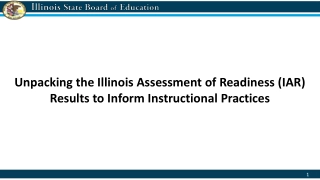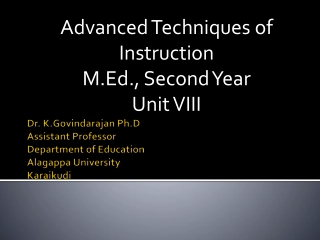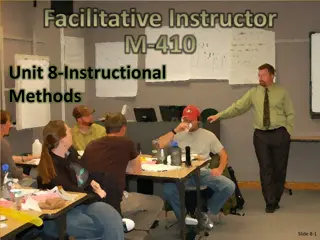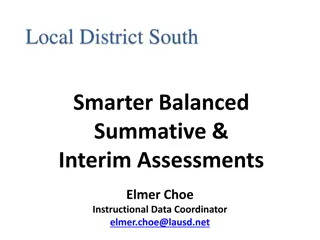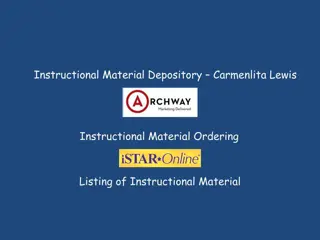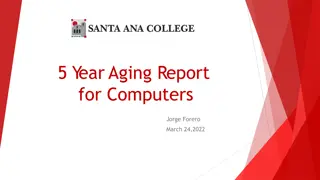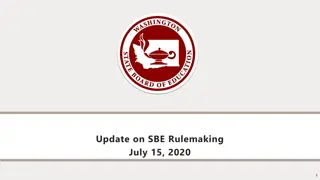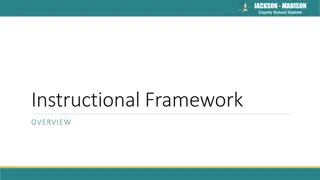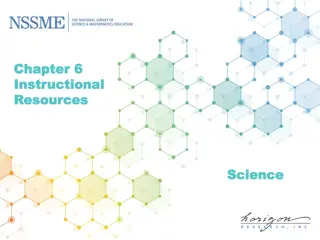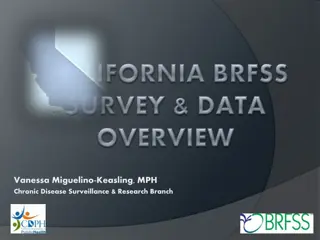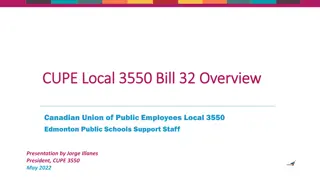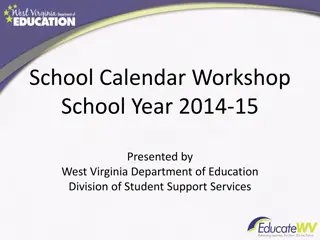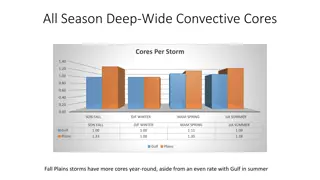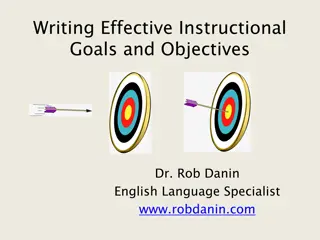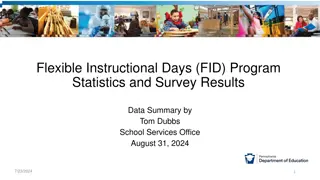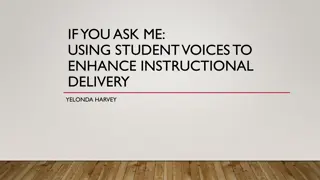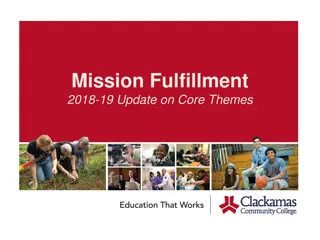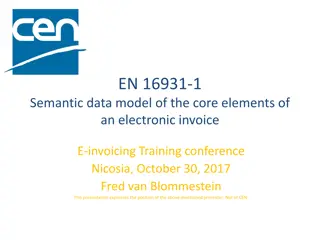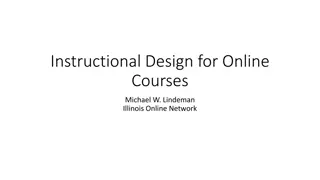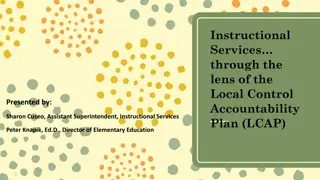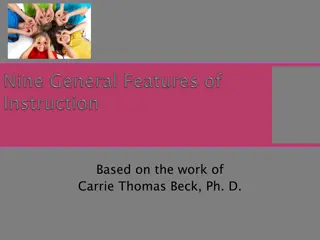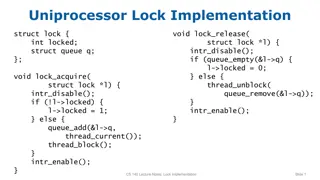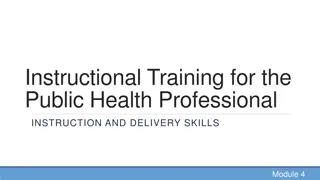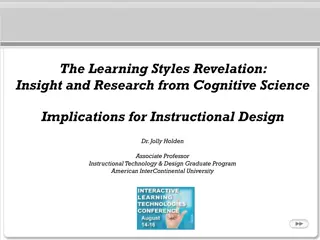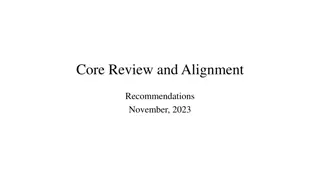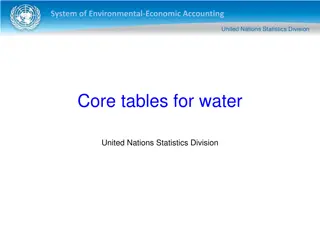Unpacking the Illinois Assessment of Readiness (IAR) Results for Instructional Enhancement
This informative content discusses a workshop aimed at helping district/school teams analyze IAR results to identify trends, enhance instructional practices, and plan for student improvement. Key topics include workshop goals, resources, and the purpose and intended uses of the IAR results.
0 views • 52 slides
Understanding Different Learning Theories and Instructional Approaches
Learning is defined as a lasting change in behavior resulting from experiences. Behaviorism, Cognitivism, and Constructivism are key theories influencing instructional design. Teachers play a crucial role in providing effective learning experiences. Empiricism and Rationalism have historically shape
2 views • 30 slides
Exploring Shared Instructional Leadership in Danish Schools
This study delves into how principals implement shared instructional leadership in Danish primary and lower secondary public schools, aiming to enhance dialogue on its potential in diverse cultural contexts. The Danish educational landscape, emphasizing autonomy and democratic participation, poses c
1 views • 14 slides
Academic Progress Monitoring for Effective Instructional Planning
Academic progress monitoring involves measuring student performance to evaluate responsiveness to interventions, guide instructional decisions, and determine when adjustments are necessary. It helps identify students needing additional support, compare instructional effectiveness, decide on changes,
2 views • 44 slides
Understanding Terrestrial Planets and Core Dynamics
Exploring the core-mantle interaction from the early Hadean period to present times reveals intriguing questions about the outer core's electrical conductivity, geodynamo sustainability, and inner core characteristics. Studies indicate challenges in maintaining the geodynamo, potential heat sources
9 views • 48 slides
Behavior Progress Monitoring for Individualized Instructional Planning
Utilizing behavior progress monitoring allows educators to track student performance over time, make data-informed decisions to improve responsiveness to interventions, and tailor instructional plans for individual students. This comprehensive approach involves steps such as setting the stage, analy
6 views • 52 slides
Effective Instructional Methods for Adult Learners
Explore six effective instructional methods for adult learners, including advantages and limitations of each. Learn how to mitigate behavior problems associated with adult learners. Discover appropriate methods for teaching first aid, FireWise principles, disseminating policy information, and discus
0 views • 13 slides
Understanding SBAC Summative and Interim Assessments for Instructional Decision Making
Resources and insights are provided for interpreting SBAC summative assessment results and using interim assessments to enhance instructional and curricular strategies. Explore California Assessment of Student Performance and Progress (CAASPP) reporting, scaled scores, achievement levels, assessment
0 views • 60 slides
Comprehensive Guide to Instructional Material Depositories and Ordering
Explore a detailed comparison of prices and shipping charges for adopted and non-adopted instructional materials across different school sizes. Get insights into ordering platforms and savings on book depositories tailored for educational institutions.
0 views • 40 slides
Comprehensive Report on Computer Aging and Replacement Plan
This detailed report provides insights into the aging of computers categorized by fiscal years, use type, and cost. It includes statistics on instructional and non-instructional desktops and laptops, accompanied by corresponding cost breakdowns. Additionally, the report outlines the funding mileston
1 views • 8 slides
Update on State Board of Education Rulemaking - July 15, 2020
A comprehensive update on the recent SBE rulemaking activities covering emergency rules, waiver authorities for private schools, instructional hours, high school graduation requirements, mastery-based crediting, and more. The content includes a review of conclusions, agenda discussions, rule timelin
0 views • 12 slides
Jackson-Madison County School System Instructional Framework Overview
In the Jackson-Madison County School System, the focus is on a research-based instructional framework consisting of curriculum, lesson structures, and authentic literacy. Emphasizing the importance of a content-rich curriculum, effective teaching practices, and purposeful literacy, the district aims
0 views • 37 slides
Enhancing Student Engagement in Online and Face-to-Face Learning Environments
Effective teaching involves engaging students in various instructional modes to enhance learning outcomes. This session explores strategies to promote student engagement through interaction, building community, and differentiating instructional methods in both virtual and physical settings.
0 views • 20 slides
Science Instructional Resources Usage in Elementary and Middle School Classes
Explore the utilization of instructional resources in science classes across elementary and middle schools. The data showcases the distribution of various types of resources such as textbooks, kits/modules, online units, and more designated for educational purposes. Discover the percentage breakdown
0 views • 52 slides
Overview of BRFSS Survey and its Core Components
The Behavioral Risk Factor Surveillance System (BRFSS) is a state-based telephone survey that monitors personal health behaviors in non-institutionalized adults. It collaborates with the CDC and all 50 U.S. states to gather data on various health topics. The survey includes fixed core questions on d
0 views • 18 slides
Overview of CUPE Local 3550's Response to Anti-Union Legislation
A detailed overview of Bill 32, an anti-union legislation affecting Canadian Union of Public Employees (CUPE) Local 3550, which requires categorization of dues into core and non-core, with members opting in for non-core spending. The local has reviewed its budget, confirming it is 100% core, and emp
0 views • 14 slides
Recertification and Assessment of Core Curriculum Courses
The Core Curriculum Council of the Faculty Senate presents a process for recertification and assessment of core curriculum courses to maintain integrity and quality. Courses must be recertified every four years to ensure consistency amidst changes in instructors, content, and teaching methods. State
0 views • 33 slides
Enhancing Alignment Between Introductory Biology and Core Courses
Explore the alignment of the Biology core curriculum, focusing on the structure, goals, and rationale behind flipping portions of the curriculum. Evaluate the preparedness of students for core courses, identify gaps, redundancies, and essential knowledge transfer. Study design involves categorizing
0 views • 25 slides
Legislative Changes in School Calendar Policies
Significant legislative revisions were made to school calendar statutes in West Virginia during the 2013 legislative session, allowing more flexibility for county boards to develop calendars while ensuring a minimum of 180 instructional days. The changes mandated public hearings, set guidelines for
1 views • 63 slides
Analysis of Seasonal Variations in Gulf Plains Convective Cores
The analysis reveals fascinating insights into Gulf Plains convective cores, showcasing variations in core numbers, average pixels per storm, pixels per core, and core sizes across different seasons. Deep-Wide cores dominate in the summer, while Gulf cores are larger in the fall. The study sheds lig
1 views • 4 slides
Enhancing Instructional Leadership Through Classroom Walkthroughs
Effective instructional leadership in schools involves principals taking on roles as instructional leaders through classroom walkthroughs. These walkthroughs help assess teaching strategies, student engagement, and classroom practices, leading to improved learning outcomes. By focusing on key compon
0 views • 7 slides
Writing Effective Instructional Goals and Objectives in Education
Determine the importance of setting clear instructional goals and objectives for effective lesson planning in education. Explore the difference between goals and objectives, understand how to write instructional goals, and learn to create specific, measurable instructional objectives for student ach
0 views • 12 slides
Flexible Instructional Days (FID) Program Overview
The Flexible Instructional Days (FID) Program allows schools to provide remote instruction on days when traditional delivery is not feasible. Schools must apply to the Pennsylvania Department of Education (PDE) to participate in the program, which requires approval by the entity's governing body. FI
0 views • 25 slides
Enhancing Instructional Delivery Through Student Voices: A Study by Yelonda Harvey
Yelonda Harvey conducted a study at a Title I school in Ward 7 to investigate the impact of different instructional strategies on students' academic progress. The research involved administering questionnaires to fifth-grade science students, focusing on student preferences for various teaching moda
0 views • 16 slides
Achieving Mission Fulfillment Through Core Themes: An Update
In 2016, our college established four core themes to represent its mission at the core. These themes - Academic Transfer, Career & Technical Education, Essential Skills, and Lifelong Learning - serve as indicators to gauge our progress towards fulfilling our mission. Currently, we are performing abo
0 views • 18 slides
Semantic Data Model of Electronic Invoicing Core Elements
Presentation by Fred van Blommestein on the EN16931-1 semantic data model of core elements in electronic invoicing, covering invoice processes, core invoice design, semantic model details, business rules, and invoicing principles. The model includes 160 elements in 33 groups, with mandatory elements
0 views • 13 slides
Effective Strategies for Online Course Development
Instructional Design for Online Courses by Michael W. Lindeman presents valuable insights into the systematic process of translating learning principles into instructional materials. It covers differences between face-to-face and online course planning, considerations for online course development,
0 views • 27 slides
Overview of Instructional Services through LCAP
Explore how Instructional Services, including Elementary Education, Special Education, Child Development, Instructional Technology, Arts & Career Technical Education, and Induction programs, are structured and evaluated within the context of the Local Control Accountability Plan (LCAP). The organiza
0 views • 38 slides
Reconsidering the Matching of Texts to Students' Reading Levels
The prevailing belief that instructional materials should be tailored to students' reading levels to enhance learning may not be as effective as commonly thought. Contrary to this idea, evidence suggests that such text placements can hinder rather than facilitate student reading achievement. The his
0 views • 45 slides
Effective Instructional Strategies for Engaging Students
Instructional tasks are modeled appropriately, explicit instruction is provided, and students are engaged in meaningful interactions. Opportunities for practice and corrective feedback are given, while encouraging student effort and success. Demonstrations and step-by-step guidance help students lea
0 views • 58 slides
Understanding ASP.NET Core: Features, Ecosystem, and Differences
ASP.NET Core is a modern framework for building web applications with cross-platform capabilities. It offers a leaner and modular approach compared to ASP.NET Framework. With support for both .NET Core and full .NET Framework, ASP.NET Core enables developers to create applications that can run on Wi
0 views • 9 slides
Lock Implementation Strategies for Single-Core and Multi-Core Systems
The provided content outlines several lock implementation strategies for both single-core and multi-core systems. It covers the structures, functions, and techniques used to manage locks efficiently, including releasing locks, acquiring locks, and handling synchronization. Different versions of lock
0 views • 6 slides
Instructional Training for Public Health Professionals Module 4
This module focuses on enhancing instructional and delivery skills for public health professionals. Participants will learn to identify factors for effective delivery, recognize positive presentation skills, and describe tools used in instructional settings. Topics covered include instructor aptitud
0 views • 23 slides
Learning Styles and Instructional Design: Debunking Misconceptions
The concept of learning styles as predictors of learning outcomes is widely misunderstood. Research shows little impact on learning outcomes. This presentation explores the implications for instructional design and questions the relevance of considering learning styles as a variable in instructional
0 views • 56 slides
Jackson-Madison County School System Instructional Framework Overview
The Jackson-Madison County School System focuses on engagement through a research-based instructional framework centered on curriculum, lesson structures, and authentic literacy. Emphasizing the importance of a content-rich curriculum and effective teaching practices, the district aims to improve in
0 views • 26 slides
Comprehensive Analysis of Instructional Model and Engagement in a Lesson
This analysis examines the instructional models exhibited by a teacher during a lesson, focusing on engagement and strengths. Recommendations for potential improvements are also discussed. The content includes images and discussions on identifying instructional models, strengths of the lesson, and r
0 views • 6 slides
Journey to the Earth's Layers
The Earth's structure consists of four main layers: the crust, mantle, outer core, and inner core. The crust is the thin, rocky layer we see on the surface, while the mantle is a solid layer that flows like a viscous liquid. The outer core is a hot, melted layer of iron and nickel, and the inner cor
0 views • 10 slides
Core Review and Alignment Committee Updates
The Core Review and Alignment Committee established in 2021 at WSU is diligently evaluating the existing core requirements, aligning them with learning outcomes, and addressing issues such as student transfers, distinctiveness of the core, and student recruitment and retention efforts.
0 views • 13 slides
ACORN Core Outcomes Research Network Overview
ACORN (ACNE CORE OUTCOMES RESEARCH NETWORK) was established in July 2013 with the aim of creating a standardized set of core outcome measures for use in acne clinical trials. Led by key individuals such as Diane Thiboutot, Jerry Tan, and Alison Layton, ACORN focuses on global representation, stakeho
0 views • 10 slides
System of Environmental-Economic Accounting Core Tables for Water
System of Environmental-Economic Accounting (SEEA) provides core tables and accounts focusing on water accounting and other environmental aspects. The core tables offer concise and relevant information essential for deriving indicators and formulating evidence-based public policies. These tables aim
0 views • 15 slides
